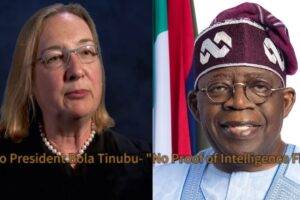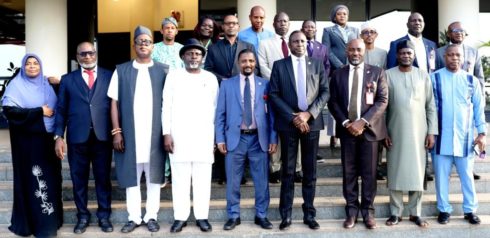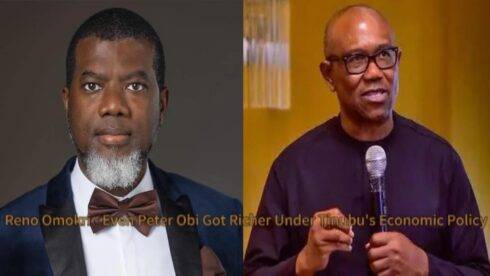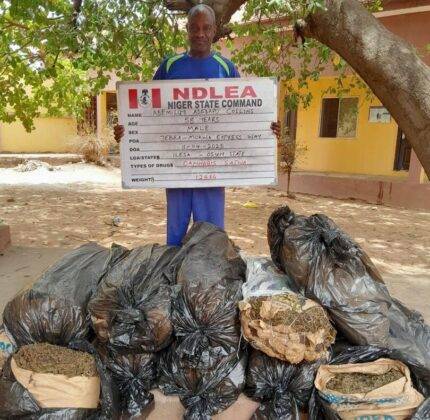On Tuesday, November 5, 2024, the Executive Chairman of the Economic and Financial Crimes Commission (EFCC), Mr. Ola Olukoyede, underscored the importance of strong collaboration in the fight against corruption in Nigeria. In a significant move, the EFCC has decided to join forces with the Code of Conduct Bureau (CCB) to tackle corruption and economic and financial crimes head-on. During a courtesy visit by the CCB Chairman, Dr. Abdullahi Usman Bello, to the EFCC’s headquarters in Abuja, Olukoyede emphasized that every stakeholder must play a role in strengthening the nation’s anti-corruption framework.
Olukoyede expressed the necessity of aligning efforts between both agencies, as they share complementary mandates. “This is not just a courtesy visit; it is an opportunity for us to bolster our existing partnership,” Olukoyede stated. He highlighted that fighting corruption in Nigeria requires a robust, coordinated approach, noting that both the EFCC and CCB have critical roles in holding public officials accountable.
The Call for Stronger Investigations and Prosecutions
Olukoyede stressed that a rigorous approach to investigations and prosecutions is essential to dismantling corruption effectively. He pointed out that addressing corruption requires a firm stance and unwavering dedication to transparency. “You don’t fight corruption with kid gloves in Nigeria. You don’t plead or beg; everyone knows corruption is a blight that hinders national progress,” he remarked. According to him, Nigerians must actively participate in eradicating corruption, as it cannot be done by foreign entities or mere passive hope for change.
The EFCC Chairman also called upon the CCB to play a more proactive role in ensuring compliance with anti-corruption regulations, especially through the Code of Conduct Tribunal (CCT). Olukoyede emphasized that a functional and effective tribunal could serve as a vital tool in achieving a corruption-free society by holding violators accountable in real-time. His remarks underscored the necessity of enforcing penalties for corruption-related offenses to dissuade public officials from engaging in unethical practices.
Reviving the Code of Conduct Tribunal for Greater Impact
A critical part of Olukoyede’s proposal included the revival of the Code of Conduct Tribunal. The tribunal, which has faced challenges in recent years, is a crucial body that addresses violations of the Code of Conduct for public officers. Olukoyede urged Bello to take steps to make the tribunal more functional and effective, thereby ensuring swift justice for those involved in corrupt practices. “Strengthening the CCT will empower both agencies to take decisive action in the anti-corruption fight,” he noted, emphasizing that a well-functioning tribunal could instill greater discipline among public servants.
The EFCC Chairman believes that through a collaborative approach, both organizations can create a formidable front against corruption in Nigeria. His vision is for the CCT to operate with renewed efficiency, thereby enhancing the country’s overall anti-corruption framework. With both agencies aligned and the tribunal actively prosecuting cases, the fight against corruption would have a more substantial impact on the public sector.
CCB Chairman Seeks EFCC’s Support for a Unified Anti-Corruption Effort
In response to Olukoyede’s remarks, the CCB Chairman, Dr. Abdullahi Usman Bello, expressed his eagerness to work closely with the EFCC. He acknowledged the EFCC’s reputation as a leading anti-corruption agency and expressed optimism that a strengthened partnership would yield effective results. “The EFCC has distinguished itself, and we seek the support and assistance to make our combined efforts robust and successful,” Bello stated.
Bello’s call for support highlights the CCB’s desire for enhanced operational efficiency and effectiveness in enforcing ethical standards among public officials. By uniting with the EFCC, the CCB aims to leverage its investigative powers to tackle corruption at its roots. This collaboration could set a new standard for anti-corruption efforts in Nigeria, sending a strong message that unethical behavior will not be tolerated and that both agencies are committed to upholding integrity in public service that will rejig the governance and improve the quality of standard of living of people
Table of Contents
Discover more from OGM News NG
Subscribe to get the latest posts sent to your email.














